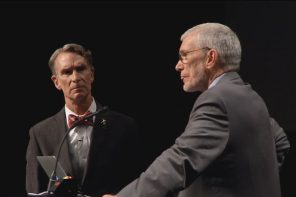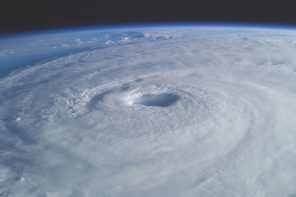The Intergovernmental Panel on Climate Change recently released its fifth report on the global climate. Summary: yep, human activity is warming the earth.
Over at the National Center for Science Education, Minda Berbeco has put together a guide to help teachers answer a reasonable question: “how can you use the IPCC in your classroom?” Understandably, Berbeco directs her advice toward biology, chemistry, and earth sciences instructors. Still, it’s helpful to keep in mind that, at its core, climate change denial isn’t strictly a matter of scientific facts. It’s also a matter of political brinkmanship, populist backlash, and libertarian fantasy, among other issues.
Naturally, some religious groups get in on the act—witness the skeptical responses to the recent IPCC report from WORLD magazine and the Christian Broadcasting Network. Clearly this isn’t just a topic for science classes. It’s for humanities and social science subjects, too! In order to build on the NCSE’s noble efforts, here’s a brief guide to integrating the IPCC report into your non-science classes:
History
Ask your students to read Richard Hofstadter’s classic essay, “The Paranoid Style in American Politics.” Discussion questions: In what way could skepticism about climate change, which demands certain changes in our lifestyle and economic activities, be linked to citizens who are “fending off threats to a still established way of life”? Do you think that the IPCC represents the “aristocratic institutions” that rouse the “manifested…animus” of those who feel locked out from positions of authority?
Social Studies and/or Economics
Try to identify a social movement in the United States that has gained broad social support while going against the express economic interests of its supporters, without any appeal to national values, legal incentives, or an obvious national threat, such as an enemy nation. Having trouble? Discuss the remote possibility, thus far difficult for many environmentalists to grasp, that economic incentives, not just facts, influence the formation of our ideologies—and that responding to these ideologies in strictly factual terms might not actually be effective.
Civics
Writing in The New York Times, public policy professor Thomas Lovejoy recently argued that the IPCC findings serve to remind us that “any debate involving science should be kept in the scientific arena.”
Discussion questions: considering that most people do not form their fundamental opinions with the educational attainment and analytical capacities of a Vulcan, what on earth could Lovejoy mean? Is it really feasible to have this conversation without any reference to human values? Does a New York Times op-ed arguing that “it is time to restore the role of science to a respected place” make it any more likely that the public will “restore the role of science to a respected place”?
Religion (for instructors in private schools, universities, or the UK)
Ask your students to cite Bible passages that explicitly cast doubt on climate change. When they fail to find any, discuss the tone of human powerlessness that accompanies a certain flavor of Protestantism. What kind of effect might this sense of human powerlessness have on our perceptions of human-made climate change?
Consider the difficulties of applying religious teachings to carbon pollution, an issue with indirect, extraordinarily complicated effects unlike anything that would have confronted our religious forebears. Look at figures 5, 7a, and 8d from the IPCC report. Ask your students to write a sermon about these figures. Ask your students to write a good sermon about these figures. Ask your students to write a sermon about these figures that could convince a skeptical believer that, even if God is in control, human beings should probably do something about the climate. Ask your students to write a sermon that would convince Congress to pass legislation on climate change. Ask your students to write a sermon, or an op-ed, or a tweet, or a hostage note that would convince Congress to pass legislation on anything.
[Note: if any of your students succeed in those last four assignments, please, please let the world know]




